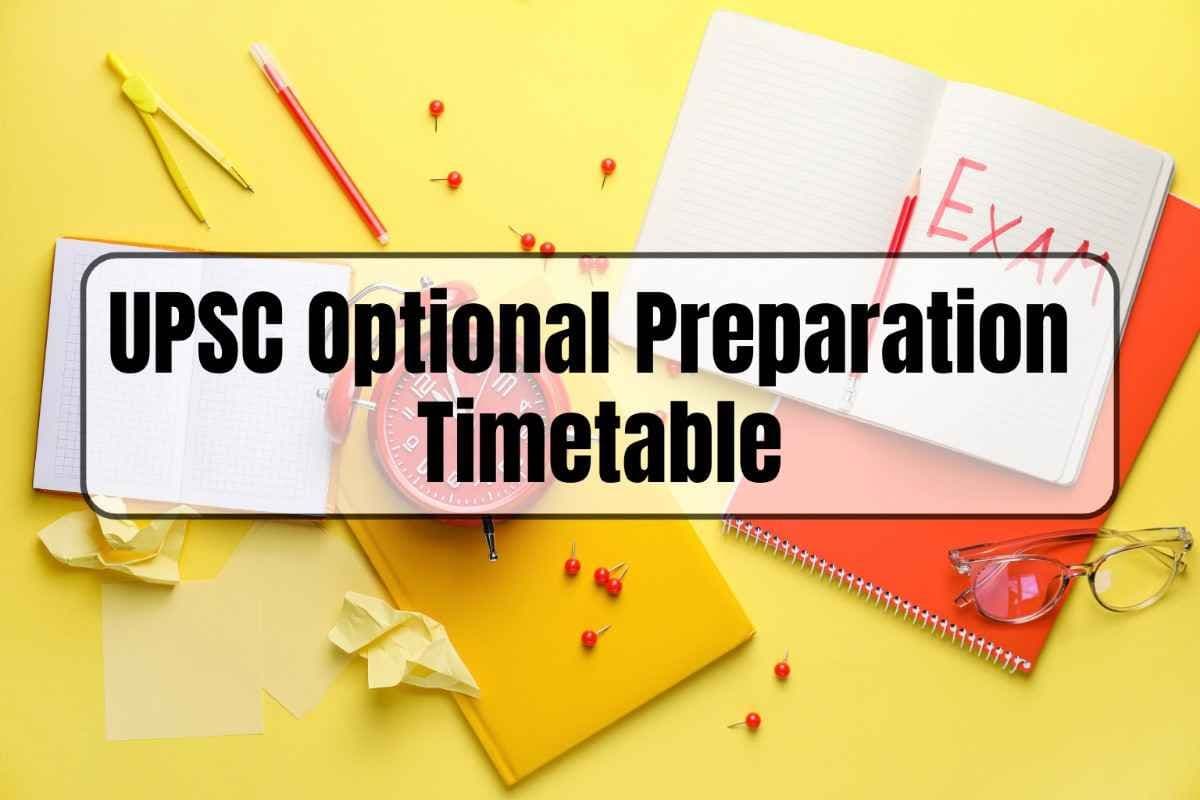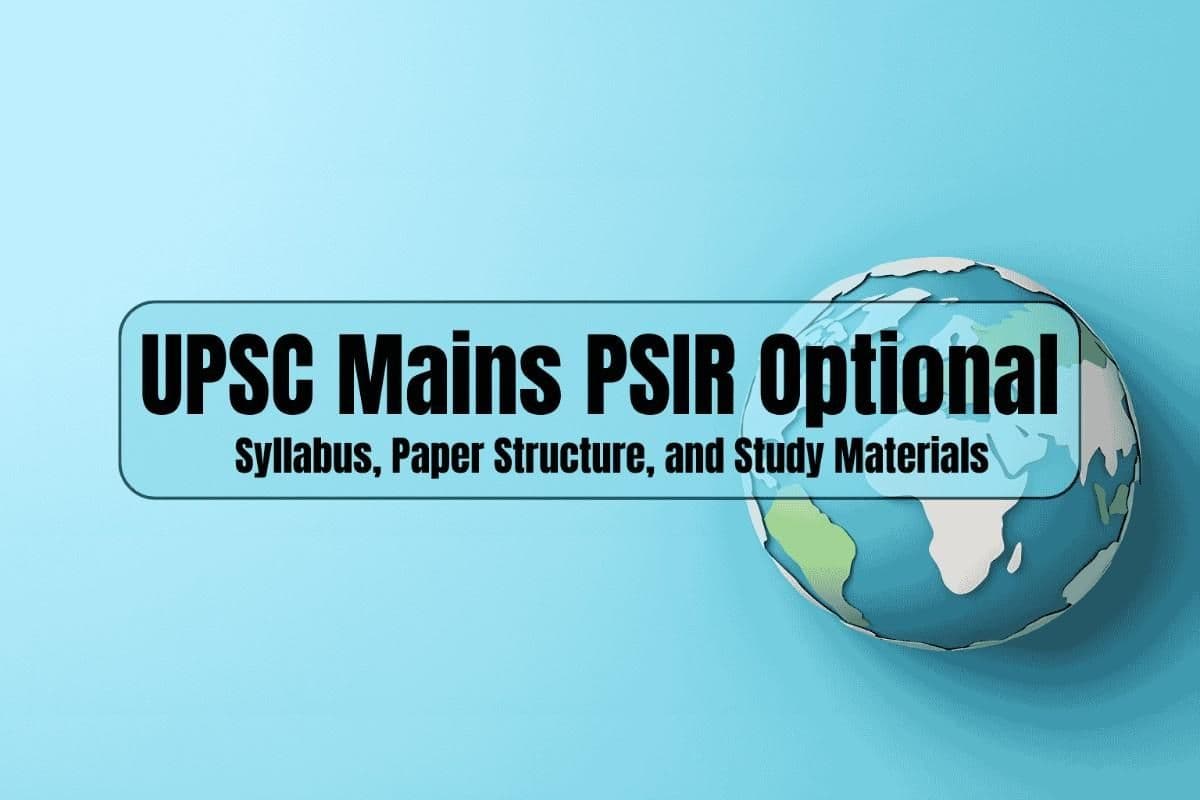UPSC PSIR Optional Strategy 2026: Best Study Plan, Topper Insights & Success Tips for Scoring 300+
Aug, 2025
•4 min read
PSIR is a trusted optional subject for the UPSC that has guided toppers like Shakti Dubey (AIR 1, 2024) and Ishita Kishore (AIR 1, 2022) to top ranks. Its overlap with General Studies, its real-life usefulness, and its interesting focus on politics, governance, and world affairs make it a great choice for aspirants who like to link their studies with current events.
This guide will provide a practical strategy with a study plan, answer-writing tips, and topper insights to boost your preparation. Let’s begin!
How PSIR Optional Can Boost Your UPSC Mains Score
Choosing the right optional subject can make all the difference in your UPSC journey, and Political Science & International Relations (PSIR) stands out for several strong reasons.
- Wide Coverage: PSIR covers Indian politics, world affairs, and core concepts useful for UPSC and beyond.
- GS Support: It overlaps with Constitution, governance, and international relations, saving time and effort.
- Practical Relevance: What you study reflects in the daily news, keeping learning interesting and real.
- Skill Building: It sharpens analytical thinking and balanced answer writing—helpful for Mains and the interview.
- Scoring Potential: With consistent practice, PSIR can deliver 300+ marks through clear and structured answers.
Now, let’s move to the most effective strategy for mastering the PSIR Optional.
Also read: UPSC Mains PSIR Optional Syllabus, Paper Structure, and Study Materials.
Toppers' Guided Strategy for UPSC Mains PSIR Optional
Preparing for the PSIR Optional needs smart planning and steady effort. Breaking it into stages helps cover the syllabus, structure answers, and revise efficiently. Here’s a complete strategy to help you master the subject.
1. Understand the Syllabus Thoroughly
PSIR comprises two papers:
- Paper I: Political Theory, Indian Politics.
- Paper II: Comparative Politics, International Relations.
Start by reviewing the full syllabus and dividing it into small, manageable topics. For example, study key ideas in Political Theory, such as liberalism, Marxism, and feminism, and focus on federalism, elections, and public policy under the Indian Government.
Tip: Go through past year papers to see which topics appear most often. Focus on high-frequency areas like democracy, political ideologies, and Indian polity.
2. Create a Strategic Study Timeline
A phased preparation plan makes the vast syllabus easy and stress-free. Here’s what you can follow:
| Phase | Duration | Focus Areas | Key Topics Coverage |
|---|---|---|---|
| Foundation | Months 1–2 | Basic Concepts, Thinkers, NCERT & IGNOU PSIR | Fundamental theories & concept clarity. Join the Super Start NCERT initiative to build the foundation. |
| Paper I Intensive | Months 3–4 | Political Theories, Indian Politics | Western & Indian political theories, Indian government, & major polity debates. |
| Paper II Mastery | Months 5–6 | Comparative Politics, World Affairs, IR | Comparative approaches, current global events, organisations, and foreign policy. |
| Writing Practice | Month 7 | Answer Writing, Essay Techniques | Structured answer writing with the use of case studies, flowcharts & quotes. Practice through the Superkalam's instant answer evaluation tool. |
| Revision & Mocks | Month 8 | Comprehensive Revision, Mock Tests | Full syllabus revision, test series practice, time management, & improvement of weak areas. |
3. Smart Learning Techniques
- Foundation Reading: Start with NCERTs (Class 9-12 Political Science), and IGNOU notes for PSIR. Focus on solid understanding, not rote learning.
- Concept Building: Move to UPSC standard books: Subhash Kashyap (Indian Constitution), Andrew Heywood (Political Theory), Global Politics, Rajiv Sikri (International Relations).
- Integration Phase: Link static theory with current affairs—use The Hindu, Indian Express, and Yojana.
Pro Tip: Spend 60% time on concepts, 40% on factual data, and current links.
4. Note-Making and Mind Maps Tips
- Prepare concise notes, topic-wise, with thinkers, keywords, and case studies.
- Create flowcharts or mind maps for complex ideas.
- Use examples from news and real-world events.
5. Answer Writing Strategy
Good answers in PSIR mean clear arguments, relevant examples, and neat presentation. How you structure your answer can impact your score as much as what you write.
- Introduction (50-60 words): Define terms, present context.
- Body: Use headings, bullet points, and diagrams if possible. Support with theorists and current examples.
- Conclusion (50–60 words): Point to forward-looking solutions, highlight relevance, and a balanced perspective.
Case Study: Toppers recommend adding “PSIR Quotes”, linking thinkers like Rousseau, Ambedkar, or Joseph Nye with contemporary issues.
6. Practice Schedule for Writing
Consistent writing helps shape your thoughts and improves speed:
- Months 1–3: Write 2 answers per week for structure.
- Months 4–6: Move to 4 answers/week, set strict time-limits.
- Months 7–8: Weekly mock tests, simulate exam conditions.
- Last Month: Daily answers and full-length mocks.
Tip: Use the SuperKalam Mains Evaluation Tool to get quick, UPSC-standard feedback in 60 seconds and improve your answer writing faster.
7. Three-Tier Revision Plan
- 1st Revision: After each subtopic, focus on theories, thinkers, and linking concepts.
- 2nd Revision: 2–3 months out, focus on answer writing, integration with current affairs.
- 3rd Revision: Last month, quick notes, rapid recall, focus on strong/weak areas.
Now, let’s learn from those who topped the PSIR Optional and see what worked for them.
UPSC Toppers Who Excelled with PSIR Optional
“Success leaves clues.” The same holds true for the UPSC PSIR optional. It’s not just about hard work, but smart planning, steady effort, and learning from past toppers. Here’s how they succeeded, and what you can learn from their strategies.
1. Shakti Dubey (AIR 1, CSE 2024) – The Persistent Achiever
What She Did:
- Stayed determined through five attempts, refining her approach each time.
- Built core PSIR concepts with NCERTs and authors like Heywood and Kashyap.
- Linked daily news to PSIR topics for fresh examples.
- Wrote answers with clear intros, solid arguments, and thinkers’ quotes.
What You Can Do:
- Begin with the NCERT Political Science and IGNOU PSIR notes.
- Read newspapers daily and map events to PSIR themes.
- Practice structured answers early, timing yourself, and using quotes.
2. Ishita Kishore (AIR 1, CSE 2022) – The Strategic Integrator
What She Did:
- Bounced back from two prelim failures to top PSIR in her third attempt.
- Merged PSIR prep with GS Paper II and Essay for efficiency.
- Scored 313 in PSIR by combining concise notes with regular revision.
What You Can Do:
- Pick an optional that fits your interest and GS synergies.
- Create brief, topic-wise notes and refresh them with current affairs.
- Write answers in study groups and use feedback to improve.
- Adopting these toppers’ disciplined habits can greatly boost your PSIR scores.
Also read: How to Choose and List of Optional Subjects in UPSC Mains.
Conclusion
With a clear strategy, focused note-making, daily writing, and regular revision, scoring 300+ in PSIR Optional is realistic and achievable. Stay positive, enjoy learning, and trust the process. The results will follow.
Start your UPSC Prep with SuperKalam. Learn smarter with the right strategy, tools and guidance.
Download the SuperKalam App Now: SuperKalam: Crack UPSC IAS
Boost your PSIR Optional Score with SuperKalam
Practice with SuperKalam Mains Evaluation Tool and get UPSC-level feedback in just 60 seconds.
Evaluate for Free

